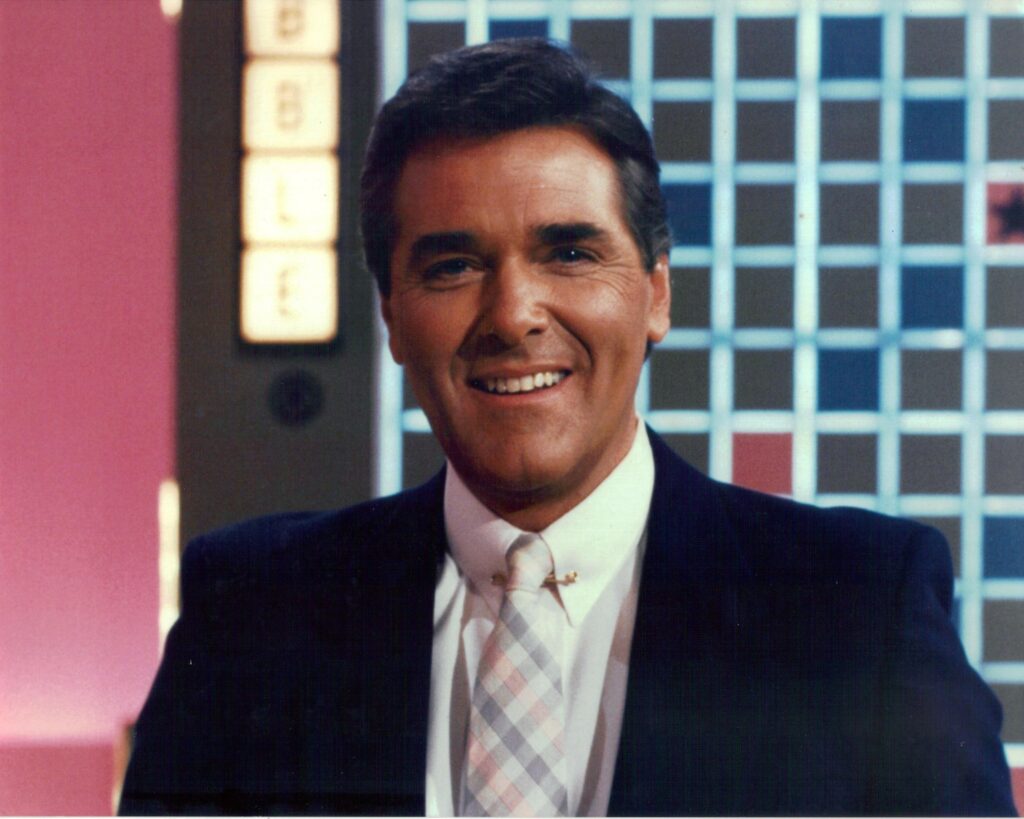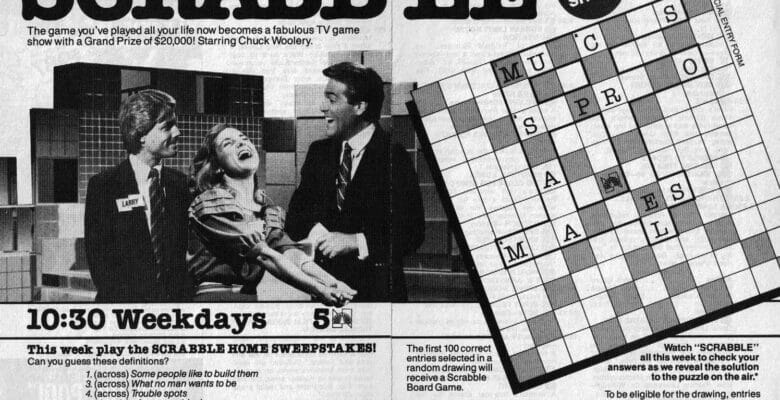By Adam Nedeff, researcher for the National Archives of Game Show History
Board games and television don’t seem like they would go together. It would be hard to imagine millions of viewers tuning in regularly to watch people play a game of Risk or Settlers of Cattan. But 40 years ago this month, viewers across the country had a six-year-long daily habit of watching people play Scrabble every day on NBC.
The Scrabble game show originated with Exposure Unlimited, a prize brokerage that game shows commissioned to acquire merchandise from vendors. Exposure Unlimited ventured outside their usual business and made a deal with Selchow & Righter for the rights to produce a television version of Scrabble. They got the rights on the cheap because S&R wasn’t even considering doing such a thing at the time. Exposure Unlimited then reached out to all the major game show packagers in Hollywood to ask if they wanted to try developing a Scrabble game show.
Reg Grundy Productions, an Australian firm which had just gained a foothold in America with Sale of the Century on NBC, expressed interest, and a team headed by long-time game show producer Robert Noah whipped up a format.

The host of Scrabble was a surprisingly apt choice. Chuck Woolery, who had hosted Wheel of Fortune on NBC for seven years before departing in a salary dispute, was suddenly back on the network just a bit more than two years later, hosting yet another NBC game show based around picking letters and solving mystery words. The pilot for the Scrabble game show, shot in 1984, was a harrowing mess. The set included a larger-than-life revolving cube that housed monitors, projectors, neon, light bulbs, and an electronic timer, all in service to various parts of the show. The NBC electricians who wired all of the equipment had warned the Scrabble team that the cube should only be turned 180 degrees. Eager to display the spinning marvel on their dazzling set, the crew in the studio made six complete 360-degree turns of the cube, severing every wire inside the cube and requiring production to shut down for major repairs. The pilot episode, which ran only 17 minutes, took a full two days to tape. But NBC saw something in the game, and a focus group for the pilot responded enthusiastically. Scrabble debuted on NBC on July 2, 1984, and compared to the disastrous pilot, the next six years were smooth sailing.
If you’ve ever pulled your hair out after seven minutes of listening to your opponent mutter “I don’t have any good letters…” you’d probably be surprised that anybody could make a game show out of Scrabble. You would be equally unsurprised to learn that the secret to success here was that the Scrabble game show wasn’t really Scrabble. In execution, it was the classic game of Hangman with Scrabble-based trappings.
Two contestants faced a gigantic Scrabble game board, drawing numbered tiles two at a time, and dropping the tiles in an electronic eye scanner to find out what letters they represented. Contestants would try to place the correct tiles in the word, while attempting to steer clear of “stoppers”—the tiles with letters that weren’t in the word.
Viewers loved the brain-tickling game and Chuck Woolery’s earthy, affable hosting style, all packaged in an elaborate setting. The set, operated properly, was a thing of beauty. An array of 14 unique sound effects helped viewers keep track of twists and turns in the game. The show even added some extra charm to the excitement of a cash bonus being awarded. The game made use of the pink and blue squares on a Scrabble board by awarding bonus money for letters placed in those squares. On the air, contestants were paid out in “Chuck Bucks”—blue and pink bills bearing Chuck Woolery’s picture instead of Ben Franklin’s.
What truly made the game special was the brilliant clue writing, supervised by former Hollywood Squares writer and future Jeopardy! head writer Gary Johnson. Each puzzle opened with a misleading, often punny, clue that made contestants scratch their head while amusing viewers and often bemusing Woolery.
A five-letter word: “She lives in the White House”—VANNA
A six-letter word: “It makes kids smile”—CHEESE
A seven-letter word: “It keeps your feet on the ground”—GRAVITY
An eight-letter word: “A man who likes people”—CANNIBAL
A nine-letter word: “After years of only seeing his own, Robinson Crusoe was shocked when he saw Friday’s”—FOOTPRINT
Scrabble enjoyed enough success that Selchow & Righter adapted it for a home version, officially titled TV Scrabble —a board game based on a game show based on a board game. A revival briefly popped up on NBC in 1993, while reruns of the original series were a hit on USA Network. The Hub cable channel managed to come up with another twist on Scrabble with an entirely different game show format; Scrabble Showdown ran in 2011 and 2012. This fall, the CW network will unleash another all-new Scrabble game show in prime time.
DO YOU REMEMBER…THESE OTHER GAME SHOWS BASED ON BOARD GAMES?
TABOO (TNN cable channel, 2003): Contestants played a game similar to Pyramid, with the caveat that each word came with a list of five “taboos,” seemingly obvious clue words that couldn’t legally be given. For example, a player conveying “PRISON” might be told that they weren’t allowed to say “jail,” “arrest,” “inmates,” “bars,” or “warden.” Chris Wylde was the host.
BALDERDASH (PAX, 2004-05): Contestants heard celebrity panelists answer various questions, having to decide each time if the panelist had given them “truth” or “balderdash.” Elayne Boosler hosted.
THE GAME OF LIFE (THE HUB cable channel, 2011-2012): Families drove their cars along the virtual game board, having to answer trivia questions every time they came to a fork in the road.



